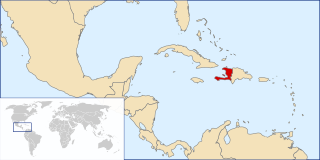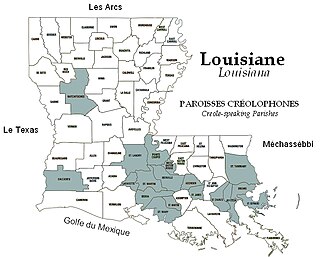External links
| This culture-related article is a stub. You can help Wikipedia by expanding it. |
The Creole Renaissance is a movement which established Creole as legitimate literary language, started in large part by authors like Felix Morisseau-Leroy, who struggled successfully to make Haitian Creole the literary, educational, and official language of Haiti. This grew, in part, out of the Negritude and Haitian Indigenism movements and the Harlem Renaissance.
| This culture-related article is a stub. You can help Wikipedia by expanding it. |

Although Haiti averages approximately 402 people per square kilometer, its population is concentrated most heavily in urban areas, coastal plains, and valleys. The majority of Haitians, 70%, are of predominantly African descent. The remaining of the population is primarily mulattoes, Europeans, Asians and Arabs. Hispanic residents in Haiti are mostly Cuban and Dominican. About two thirds of the Haitian population live in rural areas.

The Politics of Haiti take place in the framework of a unitary semi-presidential republic, where the president is the head of state and the prime minister is the head of government. The politics of the country are considered historically unstable due to various coup d'états, regime changes, military juntas and internal conflicts. After the deposition of Jean-Bertrand Aristide, however, Haitian politics entered a period of relative democratic stability. The Economist Intelligence Unit rated Haiti a "hybrid regime" in 2019.

A creole language, or simply creole, is a stable natural language that develops from the simplifying and mixing of different languages into a new one within a fairly brief period of time: often, a pidgin evolved into a full-fledged language. While the concept is similar to that of a mixed or hybrid language, creoles are often characterized by a tendency to systematize their inherited grammar. Like any language, creoles are characterized by a consistent system of grammar, possess large stable vocabularies, and are acquired by children as their native language. These three features distinguish a creole language from a pidgin. Creolistics, or creology, is the study of creole languages and, as such, is a subfield of linguistics. Someone who engages in this study is called a creolist.

The Greater Antilles is a grouping of the larger islands in the Caribbean Sea, including Cuba, Hispaniola, Puerto Rico, Jamaica, and the Cayman Islands. Six island states share the region of the Greater Antilles in total, with Haiti and the Dominican Republic sharing the island of Hispaniola. Geologically, the Virgin Islands and Sombrero Island are also part of the Greater Antilles, though politically they are considered part of the Lesser Antilles. At an area of 207,411 square kilometres (80,082 sq mi), not counting the Virgin Islands, The Greater Antilles constitute nearly 90% of the land mass of the entire West Indies, as well as over 90% of its population. The remainder of the land belongs to the archipelago of the Lesser Antilles, which is a chain of islands to the east, running north–south and encompassing the eastern edge of the Caribbean Sea where it meets the Atlantic Ocean, as well as to the south, running east–west off the northern coast of South America. The Lucayan Archipelago is not considered to be a part of the Antilles archipelagos but rather of the North Atlantic.

Haitian Creole is a French-based creole language spoken by 10–12 million people worldwide, and the only language of most Haitians. It is called kreyòl ayisyen or just kreyòl by its speakers, and créole haïtien in Standard French.

The culture of Haiti is an eclectic mix of African, Taino and European elements due to the French colonization of Saint Domingue and its large and diverse enslaved African population, as is evidenced in the Haitian language, music, and religion.

Louisiana Creole, also called Louisiana French Creole, is a French-based creole language spoken by far fewer than 10,000 people, mostly in the state of Louisiana. It is not to be confused with the Louisiana Creole people, despite the similarities of the name, as Louisiana Creole people may speak a variety of languages without necessarily speaking creole. Due to the rapidly shrinking number of speakers, Louisiana Creole is considered an endangered language.
A French creole, or French-based creole language, is a creole language for which French is the lexifier. Most often this lexifier is not modern French but rather a 17th-century koiné of French from Paris, the French Atlantic harbors, and the nascent French colonies. French-based creole languages are spoken natively by millions of people worldwide, primarily in the Americas and on archipelagos throughout the Indian Ocean. This article also contains information on French pidgin languages, contact languages that lack native speakers.

Louisiana Creole people, are persons descended from the inhabitants of colonial Louisiana during the period of both French and Spanish rule. Louisiana Creoles share cultural ties such as the traditional use of the French, Spanish and Louisiana Creole languages and predominant practice of Catholicism.

Félix Morisseau-Leroy, was a Haitian writer who wrote in Haitian Creole for poetry and plays, the first significant writer to do so. By 1961 he succeeded in having Creole recognized as an official language of Haiti, after expanding its teaching in schools and use in creative literature. Morisseau also published works on French, Haitian Creole and Haitian French literature. He worked internationally, encouraging the development of national literature in post-colonial Ghana and Senegal. In 1981 he settled in Miami, Florida, where he was influential in uniting the Haitian community around Creole and encouraged its study in academia.

Josaphat-Robert Large was a Haitian-American poet, novelist and art critic. His novel Les terres entourées de larmes [Shore surrounded with tears] won the prestigious Prix littéraire des Caraïbes in 2003. He was nominated for the Haitian grand Literary Prize of 2004, together with Edwidge Danticat, René Depestre, Frankétienne, Gary Klang, Dany Laferrière and Leslie Manigat.

Haiti has a sizable diaspora, present chiefly in the Dominican Republic, the United States, Canada, Cuba, the Bahamas, and France. They also live in other countries like Belgium, Jamaica, Turks and Caicos, Mexico, U.S. Virgin Islands, Brazil and Chile, among others.
ISO 3166-2:HT is the entry for Haiti in ISO 3166-2, part of the ISO 3166 standard published by the International Organization for Standardization (ISO), which defines codes for the names of the principal subdivisions of all countries coded in ISO 3166-1.

Grand-Gosier is a commune in the Belle-Anse Arrondissement, in the Sud-Est department of Haiti. It has 10,852 inhabitants.
Haitian literature has been closely intertwined with the political life of Haiti. Haitian intellectuals turned successively or simultaneously to African traditions, France, Latin America, the UK, and the United States. At the same time, Haitian history has always been a rich source of inspiration for literature, with its heroes, its upheavals, its cruelties and its rites.
Haitian Creole is a French-based creole spoken in Haiti, located on the western three-eighths of the island known as Hispaniola. The façon de parler is a result of the gradual change of the French dialect of Franco-European colonists by African and Creole slaves. This change includes the speaking of French vocabulary in an African (Fon) syntax.

The languages of the Caribbean reflect the region's diverse history and culture. There are six official languages spoken in the Caribbean. The six languages are:

Haitians are the citizens of Haiti and their descendants in the Haitian diaspora.
Haitian Cubans are Cuban citizens of full or partial Haitian ancestry.
Haitian French is the variety of French spoken in Haiti. Haitian French is close to standard French. It should be distinguished from Haitian Creole.